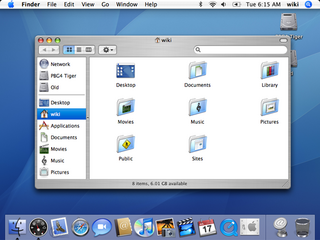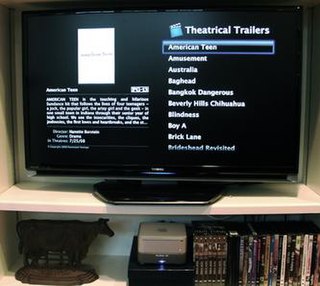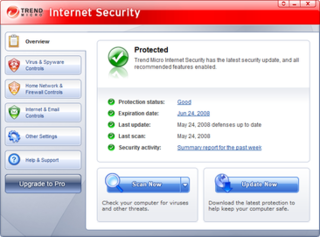Spyware is any software with malicious behavior that aims to gather information about a person or organization and send it to another entity in a way that harms the user by violating their privacy, endangering their device's security, or other means. This behavior may be present in malware and in legitimate software. Websites may engage in spyware behaviors like web tracking. Hardware devices may also be affected.

A desktop computer is a personal computer designed for regular use at a stationary location on or near a desk due to its size and power requirements. The most common configuration has a case that houses the power supply, motherboard, disk storage ; a keyboard and mouse for input; and a monitor, speakers, and, often, a printer for output. The case may be oriented horizontally or vertically and placed either underneath, beside, or on top of a desk.

System 7, codenamed "Big Bang", and later also known as Mac OS 7, is a graphical user interface-based operating system for Macintosh computers and is part of the classic Mac OS series of operating systems. It was introduced on May 13, 1991, by Apple Computer. It succeeded System 6, and was the main Macintosh operating system until it was succeeded by Mac OS 8 in 1997. Current for more than six years, System 7 was the longest-lived major version series of the classic Macintosh operating system. Features added with the System 7 release included virtual memory, personal file sharing, QuickTime, QuickDraw 3D, and an improved user interface.

Connectix Corporation was a software and hardware company, noted for having released innovative products that were either made obsolete as Apple Computer incorporated the ideas into system software, or were sold to other companies once they became popular. It was formed in October 1988 by Jon Garber; dominant board members and co-founders were Garber, Bonnie Fought, and close friend Roy McDonald. McDonald was still Chief Executive Officer and president when Connectix finally closed in August 2003.

Mac OS X Tiger is the 5th major release of macOS, Apple's desktop and server operating system for Mac computers. Tiger was released to the public on April 29, 2005 for US$129.95 as the successor to Mac OS X 10.3 Panther. Included features were a fast searching system called Spotlight, a new version of the Safari web browser, Dashboard, a new 'Unified' theme, and improved support for 64-bit addressing on Power Mac G5s. Mac OS X 10.4 Tiger also had a number of additional features that Microsoft had spent several years struggling to add to Windows with acceptable performance, such as fast file searching and improved graphics processing.

A home theater PC (HTPC) or media center computer is a convergent device that combines some or all the capabilities of a personal computer with a software application that focuses on video, photo, audio playback, and sometimes video recording functionality. Since the mid-2000s, other types of consumer electronics, including game consoles and dedicated media devices, have crossed over to manage video and music content. The term "media center" also refers to specialized application software designed to run on standard personal computers.
Norton AntiVirus is an anti-virus or anti-malware software product founded by Peter Norton, developed and distributed by Symantec since 1990 as part of its Norton family of computer security products. It uses signatures and heuristics to identify viruses. Other features included in it are e-mail spam filtering and phishing protection.
Norton Internet Security, developed by Symantec Corporation, is a discontinued computer program that provides malware protection and removal during a subscription period. It uses signatures and heuristics to identify viruses. Other features include a personal firewall, email spam filtering, and phishing protection. With the release of the 2015 line in summer 2014, Symantec officially retired Norton Internet Security after 14 years as the chief Norton product. It was superseded by Norton Security, a rechristened adaptation of the Norton 360 security suite.
The Apple community is a group of people interested in Apple Inc. and its products, who report information in various media. Generally this has evolved into a proliferation of websites, but latterly has also expanded into podcasts, either speculating on rumors about future product releases, simply report Apple-related news stories, or have discussions about Apple's products and how to use them.

Microsoft Internet Explorer 4 (IE4) is the fourth, and by now, discontinued, version of the Internet Explorer graphical web browser that Microsoft unveiled in Spring of 1997, and released on September 22, 1997, primarily for Microsoft Windows, but also with versions available for the classic Mac OS, Solaris, and HP-UX and marketed as "The Web the Way You Want It".

Windows Vista is a major release of Microsoft's Windows NT operating system. It was released to manufacturing on November 8, 2006, and became generally available on January 30, 2007, on the Windows Marketplace, the first release of Windows to be made available through a digital distribution platform. Vista succeeded Windows XP (2001); at the time, the five-year gap between the two was the longest time span between successive Windows releases.

A Hackintosh is a computer that runs Apple's Macintosh operating system macOS on computer hardware that is not authorized for the purpose by Apple. This can also include running Macintosh software on hardware it is not originally authorized for. Benefits of "Hackintoshing" can include cost, ease of repair and piecemeal upgrade, and freedom to use customized choices of components that are not available in the branded Apple products. macOS can also be run on several non-Apple virtualization platforms, although such systems are not usually described as Hackintoshes. Hackintosh laptops are sometimes referred to as "Hackbooks".

The "Get a Mac" campaign is a television advertising campaign created for Apple Inc. by TBWA\Media Arts Lab, the company's advertising agency, that ran from 2006 to 2009. The advertising campaign ran worldwide in the United States, Canada, Australia, New Zealand, the United Kingdom, Japan, and Germany.

Kaspersky Anti-Virus is a proprietary antivirus program developed by Kaspersky Lab. It is designed to protect users from malware and is primarily designed for computers running Microsoft Windows and macOS, although a version for Linux is available for business consumers.

MacSweeper is a rogue application that misleads users by exaggerating reports about spyware, adware or viruses on their computer. It is the first known "rogue" application for the Mac OS X operating system. The software was discovered by F-Secure, a Finland-based computer security software company, on January 17, 2008.
Pre-installed software is software already installed and licensed on a computer or smartphone bought from an original equipment manufacturer (OEM). The operating system is usually factory-installed, but because it is a general requirement, this term is used for additional software apart from the bare necessary amount, usually from other sources.

Trend Micro Internet Security is an antivirus and online security program developed by Trend Micro for the consumer market. According to NSS Lab comparative analysis of software products for this market in 2014, Trend Micro Internet Security was fastest in responding to new internet threats.
The following outline of Apple Inc. is a topical guide to the products, history, retail stores, corporate acquisitions, and personnel under the purview of the American multinational corporation Apple Inc.

Mac OS is the series of operating systems developed for the Macintosh family of personal computers by Apple Computer from 1984 to 2001, starting with System 1 and ending with Mac OS 9. The Macintosh operating system is credited with having popularized the graphical user interface concept. It was included with every Macintosh that was sold during the era in which it was developed, and many updates to the system software were done in conjunction with the introduction of new Macintosh systems.
Comparison of user features of operating systems refers to a comparison of the general user features of major operating systems in a narrative format. It does not encompass a full exhaustive comparison or description of all technical details of all operating systems. It is a comparison of basic roles and the most prominent features. It also includes the most important features of the operating system's origins, historical development, and role.












